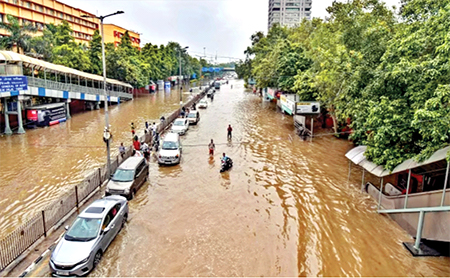The engines of one of the world’s fastest growing economies, the Indian cities have been facing an exponentially growing threat of urban flooding, like an annual monsoon ritual. Be it the unpredictability of monsoon or be it the effects of climate change, the issue boils down to lack of competent addressal and tailored strategies to mitigate risks of urban floods. Similar to the way the annual Budget attracts many experts and commentaries, urban flood also generates many media pieces which seem to be going down the drains, instead of the rainwater. Where the cities continue to grapple with loss of lives and disruptions in livelihoods, this piece as well, tries to take stock of the situation with a ‘dry’ hope of change about an issue that is getting more and more ‘wet’ every year.
Report on Rising Flood Risks
A 2020 report, published by the Ministry of Earth Sciences, categorically highlighted the link between climate change and rising flood risks in urban India. The report also sheds light on how the amplified frequencies of rainfall occurring on sub-daily and daily timescales have heightened the flood risks across Indian cities. Multiple climatological studies and weather forecast reports have been highlighting the unpredictability of monsoon. The disproportionate equation between the number of rainy days and intensification in precipitation has been putting tremendous pressure onto existing physical infrastructure (drainage, stormwater, sanitation) exposing its capacity to handle extreme weather patterns. As a result, cities face the brunt of rainfall within a few hours and experience inundation in multiple aspects.
Outdated Design of Drain
This takes us to the scrutiny of the existing drain systems. The fundamental design of the drain system is outdated and not at par with changing rainfall patterns. Majority of the cities have complex drains that are designed for a rainfall intensity of 12-20 mm per hour whereas the current rainfall standards are five to ten times higher. The Draft Manual on Storm Water Drainage Systems, prepared by the Ministry of Housing and Urban Affairs in 2019, and the interventions through AMRUT Yojana have had limited success due to challenges at State level or city level. Although the document specifies the latest drain design practices, the sheer complexity of it as well as other political factors have minimised its implementation rate on ground. As a result, urban floods have become an annual monsoon ritual.
Another significant hurdle in clinching this issue is the lack of real time data, its mapping and the governance in accordance with its interpretation. This affects the preventive measures such as annual maintenance, desilting, adherence to national manuals and solid waste management. Although State Governments have undertaken multiple drives at their level to tackle urban floods, the issue keeps exacerbating due to the lack of efficiency in preventive measures.
Further, multiple factors such as constructions blocking natural water channels, depleting wetlands and mangroves for construction, constructions in low-lying areas or marshy lands have been fanning this wet fire. The administrative and political nexus at the ground level, which results in violation of building bylaws or unauthorised concretisation of peri-urban areas, has been one of the root causes of urban flooding which was exposed during the Chennai floods of 2015 and Bengaluru floods of 2022.
Frequently and annually this issue of urban floods has been causing huge economic and welfare losses in cities like Mumbai, Kolkata, Chennai, Hyderabad, Bengaluru and Thiruvananthapuram. However, like many other instances, the issue becomes a ‘national issue’ if and only when it occurs in Delhi due to mainstream media’s Delhi-centric approach. This results in lack of awareness about urban flooding in the philanthropic and development sector, attracting lesser solutions, fundings as well as the actual action.
Nevertheless, the floods of Delhi this year are the latest exposé of failed governmental prevention and cure. Very conveniently, the Delhi Government attributed the crisis to extreme rainfall and inadequacy of existing infrastructure. However, a closer examination reveals that the situation is not as ‘conveniently natural’ as it seems. The rainfall in Delhi is not unprecedented. The data trends of the past three decades have been showing consistent increase in the frequency of heavy rainfall events. In fact, only in 2021, the total rainfall was double the usual and second highest till date, thereby indicating a clear change in climate pattern. Against this backdrop, actions and policies of the State Government have become questionable as to how the issue could have been predicted and prevented by adopting practical solutions to improve the city’s complex drainage network. One such set of recommendations, prepared as the ‘Drainage Master Plan (DMP)’ by the experts of IIT Delhi, was rejected by the Delhi Government. Such decisions, in addition to prevailing issues of encroachments, sewage dumping, garbage disposal and population growth lead to disastrous situations even before the actual disaster takes place. Where the DMP provided various cost-effective measures to rejuvenate water bodies and construction of colony-level storm water drains, the Delhi Government went on to appoint new ‘consultants’ to carve fresh strategies, thereby delaying the risk reduction preparedness.
In conclusion, the urgency to tackle urban flooding issues in urban India cannot be overstated. As the impact of climate change intensifies and the complexity in urban infra piles up, immediate curative and preventive measures are required to be undertaken. Where the preventive measures include setting up of urban flood cells and monitoring centers at each scale of governance, the curative measures include inviting philanthropic fundings to improve situations at city level. Alternative sources of funding, prudent implementation of live Master Plans and enhancing community awareness are additional solutions. However, the current foremost need is to create an echo-chamber of ‘If you fail to plan, you plan to fail’ for every scale of governance and every type of stakeholder involved to awaken against the alarming hazard of urban floods.




















Comments